Sedation Dentistry – Fair Oaks, CA
Your Comfort
Guaranteed

The idea of undergoing oral surgery is enough to make even the bravest person feel nervous, and we completely understand! Dr. Ji and the rest of our team believe that patient comfort is extremely important, so to ensure everyone has a relaxing experience while under our care, we’re happy to offer a variety of sedation dentistry techniques. Safe, gentle, and proven to be effective, sedation can help even the most persistent worries float away on a river of calm. To learn more about your sedation options with us, feel free to give us a call any time.
Why Choose Sheng Ji, DDS, MD Oral & Maxillofacial Surgery for Sedation Dentistry?
- Patient Comfort Always Comes First
- Surgeon Dual-Trained in Medicine & Dentistry
- Extensive Training in All Forms of Anesthesia
Nitrous Oxide Sedation
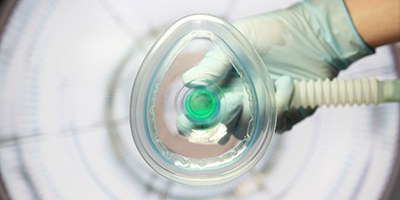
Nitrous oxide is so safe that it can even be used to help very young children, though it’s also effective for fully-grown adults. A patient simply inhales the odorless gas through a nasal mask to help them become more tranquil during a procedure. It only takes a few minutes for a patient to experience the effects, and once the appointment is over and the mask is removed, they quickly go away, allowing a patient to go straight back to their day without interruption.
How Does Nitrous Oxide Work?
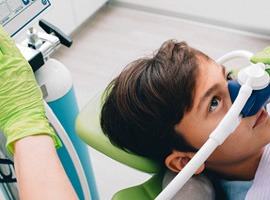
Compared to other sedatives, nitrous oxide is a bit more straightforward in how it works. We simply place a special mask over your nose, then titrate the gas to the right concentration to provide you with a steady supply of nitrous oxide. This special gas will start working very shortly after you first inhale it and invokes a general sense of calm and euphoria.
By no means will you be rendered unconscious at any point; in fact, you’ll be able to answer Dr. Ji’s questions and follow any directions he might provide. Note that the level of sedation won’t necessarily be a constant throughout the procedure; we can decrease the level of sedation if we deem it necessary. You generally don’t need to fast to prepare for the procedure, although we may suggest that you refrain from eating for at least two hours beforehand.
What are the Benefits of Nitrous Oxide?

- Full Consciousness: Despite your relaxed state, you’ll still be completely aware of your surroundings so that you can speak with Dr. Ji or any family members that happen to be nearby.
- Quick Onset: You’ll start feeling the effects of nitrous oxide almost immediately as soon as you first start breathing it in.
- No Needles: Nitrous oxide is delivered in a gas form, hence no needles are required. It only requires a mask.
- Reduce Gagging: Have you had trouble at the dentist’s office before because of a gag reflex that you couldn’t control? Nitrous oxide can help reduce gagging sensation.
- Shorter Recovery Time: After using other forms of sedation, it’ll be some time before the effects completely wear off. With nitrous sedation, though, your full awareness will return after just five minutes.
What Can You Expect After the Procedure?

One of the biggest advantages of using nitrous oxide is that it won’t disrupt the rest of your day. After the mask is taken away, you’ll simply have to wait a few minutes before you return to your regular mental state. You’ll be able to drive home by yourself, and you can go back to work immediately in order to continue your normal activities. If nausea or any other side effects do not dissipate over time, call our office.
Oral Conscious Sedation
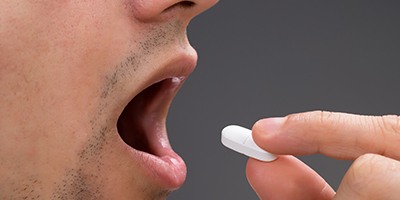
For patients who experience mild to moderate anxiety associated with an upcoming procedure, Dr. Ji can prescribe them a medication to take at home the day of the appointment. The goal is for you to be sedated by the time you reach our oral surgery office so you feel comfortable from check-in to checkout. While in the chair, you will remain awake, but time will seem to go by very fast, and you will likely have fuzzy memories (if any) after your visit.
What is Oral Conscious Sedation?

One of the great things about oral conscious sedation is that it does not involve the use of needles or a face mask. All you have to do is take a pill prior to your appointment. Depending on a few different factors, you might be prescribed to take Valium, Ativan, Halcion, or another medication that helps the mind and body to relax.
Within a few minutes of taking the pill, you will start to feel calm and perhaps a bit drowsy. The effects may last for several hours — more than enough time for you to breeze through your procedure.
How Does Oral Conscious Sedation Work?
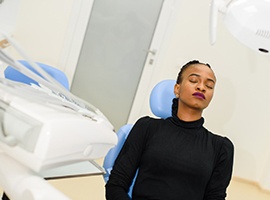
Here are some notes on what to expect if you are a candidate for oral conscious sedation:
- You should not drive while under the influence of sedation, so you should have a trusted friend or family member available to drive you to and from our office.
- You will probably not remember your procedure after the effects of the medication wear off.
- The sedation will not make you lose consciousness, but it is possible that you will drift off to sleep during your appointment.
Are You a Good Candidate for Oral Conscious Sedation?

Oral conscious sedation is a good fit for many patients who suffer from mild to moderate dental anxiety. It can also be a great option if you have a sensitive gag reflex, must undergo multiple procedures in a single appointment, or are undergoing a particularly complex or invasive treatment.
Oral conscious sedation might not be right for you if you are pregnant or have certain other health conditions. Our team will thoroughly screen you before prescribing any type of sedative.
IV Sedation

With IV sedation, the sedative is administered directly into the bloodstream using an injection in the hand or arm. This helps you become deeply relaxed very quickly, and we can actually adjust the sedative level in real time to ensure you feel comfortable moment to moment. This approach is typically recommended for patients who have severe anxiety and/or are in need of an extensive procedure.
What is IV Sedation?

Instead of swallowing or inhaling the medication used in other forms of sedation, IV sedation medications will be delivered directly via one of your veins (usually on one of your hands). The combined effects of various medications we use will place you in a state of deep relaxation/sedation. You will still be able to breathe on your own and maintain all your protective reflexes, but otherwise in a state of twilight sleep, where you will drift in and out of sleep.
You’ll experience little to no fear and no pain during your surgery, but you probably won’t remember much of what happened anyway due to the memory loss that often occurs as a side effect. IV sedation is one of the safest and most effective ways to deliver sedation to patients in well trained hands, given the ability to accurately control effects of medications in a timely and titratable manner.
Who is a Good Candidate for IV Sedation?
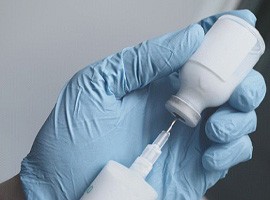
Not every patient requires IV sedation, but we typically recommend it for those that:
- Have a fear of dental treatment or a history of traumatic dental experiences, often to the point where they have avoided professional dental care for years or even decades
- Suffer from a powerful gag reflex or extremely sensitive/infected “hot” tooth
- Have trouble sitting still for long periods of time
- Are undergoing surgery or are otherwise being treated for a complex dental problem
- Do not react well to medicine meant to numb the mouth
How Does IV Sedation Work?

At the beginning of the procedure, Dr. Ji will seek out a good vein (usually on your arm or hand) to place the small catheter. Depending on each patient’s medical history, a combination of various medications to relieve pain and anxiety will be titrated and delivered into the bloodstream, where it will remain active for the remainder of the surgery.
Throughout surgery, Dr. Ji and the team will continuously keep track of your vital signs and breathing to make sure that your body remains stable. We can use more or less sedative depending on how the surgery proceeds. It is expected that you will still be somewhat drowsy by the time the surgery is done due to lingering effects of medications. You won’t be able to drive on your own in such a state, so you’ll need to make arrangements for someone else to take you home.
What to Expect Afterwards

You’ll be slightly drowsy after the procedure, but this feeling is only temporary. The feeling should wear off after you’ve had a chance to rest for several hours. For at least one day after the surgery, avoid strenuous exercise, medicine that has not already been approved by Dr. Ji, and alcohol. Also, stay away from any situation that would require you to operate a car or another kind of heavy machinery.
General Anesthesia
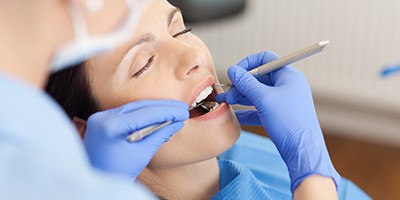
General anesthesia is the most powerful form of sedation. It enables a patient to literally sleep through their appointment and wake up with absolutely no memory of what happened during treatment. This method is very helpful for patients undergoing extensive surgical procedures and those who need multiple procedures completed in a single appointment in order to save time and achieve results as quickly as possible.
What is General Anesthesia?

While other types of sedation may casually be referred to as “sleep dentistry,” general anesthesia is the only option that actually causes unconsciousness. It involves the use of both inhaled gases and medications that are administered through an IV. In some ways, it is similar to what hospitals use when patients must undergo major surgery. However, the general anesthesia used for oral procedures tends to be a bit milder.
When you are under general anesthesia, you will not experience any sensations and be unable to respond to outside stimuli.
Who is a Good Candidate for General Anesthesia?

General anesthesia is very powerful, so Dr. Ji does not recommend it for everyone. However, it is suitable for certain groups of patients. It might be right for you if:
- You have a high tolerance for milder forms of sedation.
- You suffer from extreme fear related to dental or medical procedures.
- You must undergo a particularly invasive or complex type of oral surgery.
- You do not have any health conditions that would make it unsafe for you to be put under the influence of general anesthesia. Our team will thoroughly screen you for all such conditions during the treatment planning process.
Before & After General Anesthesia
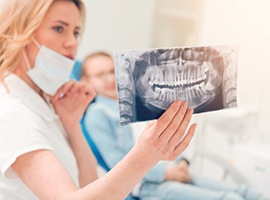
Here are a few notes to keep in mind about what you may experience before and after a procedure that requires the use of general anesthesia:
- Prior to your appointment, you might need to temporarily stop taking certain medications, such as blood thinners.
- You may need to fast for several hours before your procedure. It should be fine to consume clear liquids until the last couple of hours before you are put under anesthesia.
- When you wake up from anesthesia, you are likely to feel groggy and experience other side effects. Most people are feeling like themselves again within 24 hours.
- While the general anesthesia is still in your system, it will not be safe for you to drive. A trusted adult should be available to drive you home from your appointment.
Sedation Dentistry FAQs
Is sedation dentistry safe?
Sedation dentistry is safe for most patients. Before we approve you for any type of sedation, we will learn about your medical history, your current medications, and other factors that may have a bearing on whether sedation is appropriate for you. This careful screening reduces the risk that patients will suffer adverse effects.
While you are sedated, our team will carefully monitor you for any indications that something is amiss. On the small chance that something goes wrong, we are always ready to leap into action to provide the needed medical assistance. Dr. Ji is both a board-certified oral surgeon and a medical doctor, making him more than qualified to responsibly administer sedation.
What does nitrous oxide feel and smell like?
Many patients experience a tingling sensation in their body. Feelings of happiness are also common, which is why nitrous oxide is often referred to as “laughing gas.” Most importantly, it induces a feeling of relaxation. The gas is almost odorless, but it does have a slightly sweet smell. In some cases, a pleasant fragrance may be added to it to enhance the patient experience.
Will I remember anything with dental sedation?
Whether you remember anything after your procedure will depend a lot on which type of sedation you receive. If you are put under general anesthesia, you will be unconscious and will therefore remember nothing. Although patients are technically conscious with IV sedation and oral sedation, post-op amnesia is a common side-effect. Amnesia is less common with nitrous oxide. Many patients are glad that they do not remember their oral surgeries; they dislike the sights and sounds of dental procedures and do not want to keep them in mind.
Are there any risks associated with nitrous oxide?
Nitrous oxide is generally very safe. Occasionally, a patient will experience side effects. These might include sweating, a headache, nausea, and dizziness. A small percentage of people are allergic to nitrous oxide, so be sure to tell Dr. Ji or one of our staff members if you have had an adverse reaction to it in the past. Potential signs of an allergic reaction include fever, chills, difficulty breathing, and hives.
How much does sedation dentistry cost?
General anesthesia is the most expensive form of sedation because it requires complex monitoring equipment and a high level of training to administer. IV sedation also requires much expertise and may be somewhat costly. Oral conscious sedation and nitrous oxide are more affordable, often costing just a few hundred dollars.
Our team will be sure to give you candid price estimates before you commit to anything. We can also help you apply for financing if you would like to pay for your entire treatment, including sedation, over time.
What procedures is nitrous oxide used for?
When you visit our practice, we will evaluate your needs before determining which type of sedation is right for you. If you require a particularly extensive or complex procedure, a more powerful form of sedation than nitrous oxide might be best. However, if your surgery will be relatively simple and quick, nitrous oxide may be recommended. We will also account for things like your medical history and personal preferences when we are determining which type of sedation to administer.
I’m pregnant—can I be sedated with nitrous oxide?
Nitrous oxide is classified as a pregnancy risk category C medication, which means that risks for fetuses cannot be totally ruled out. However, in many cases, the rewards of using a category C medication outweigh the potential risks. In general, we recommend that pregnant individuals wait until after giving birth to undergo oral surgery. Of course, if you have an urgent need for oral surgery — such as if an impacted wisdom tooth is causing severe pain or threatening your overall health — you should certainly request an appointment with us sooner rather than later.
Is sedation dentistry covered by insurance?
Most insurance plans consider sedation to be a luxury, so they do not cover it. However, there are some exceptions. For example, if you have a disability that makes it difficult for you to stay still during dental treatments, your insurance policy may be more flexible. Also, if your procedure is particularly complex or lengthy, sedation might be deemed necessary and therefore be covered. Our practice welcomes dental insurance and will be happy to help you figure out how your policy applies to your recommended treatment plan.
What are the possible side-effects of IV sedation?
Common side effects include slight bruising or swelling where we insert your IV, headaches and nausea upon awakening, and other minor discomforts. More severe side effects are very rare, so they should not hold you back from committing to IV sedation if Dr. Ji recommends it for you. Such serious side effects can include breathing problems, fainting, persistent vomiting, and severe skin irritation. In most cases, those problems can be avoided if you provide us with a thorough medical history before we approve you for sedation.
What’s the difference between IV sedation and general anesthesia?
Both IV sedation and general anesthesia are powerful methods that can help patients relax during procedures. However, there is a big difference between the two. General anesthesia induces complete unawareness of a person’s surroundings, and it slows down breathing to the point where patients need assistance to get enough oxygen into their system. IV sedation is milder. It does not produce unconsciousness, and patients can breathe on their own while under its influence.
Can any dentist offer IV sedation?
No. While most dentists are qualified to administer nitrous oxide, more complex forms of sedation require extra training and expertise. State and local regulations also have a bearing on what types of sedation a dental practice can offer. As an oral surgeon who is dual-trained in both medicine and dentistry, Dr. Ji is more than qualified to provide IV sedation.
What are the contraindications for IV sedation?
Most patients are eligible for IV sedation. However, your sedation dentist in Fair Oaks may look for other ways to enhance your comfort if you are pregnant, have allergies to certain medications, or have some forms of glaucoma. Other conditions that may call for extra caution, but which will not necessarily stop you from undergoing IV sedation, include impaired lung, liver, or kidney function, advanced age, and breathing disorders (such as sleep apnea).
Dental Implants Wisdom Teeth Removal General Oral Surgery View Our Procedures
